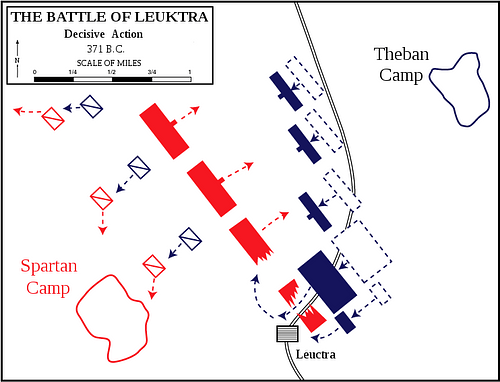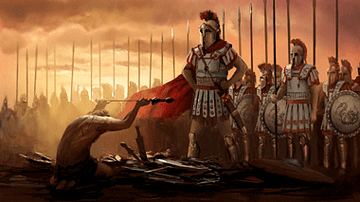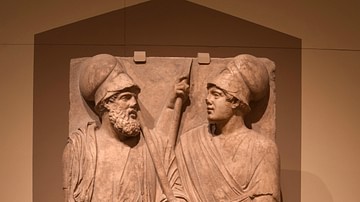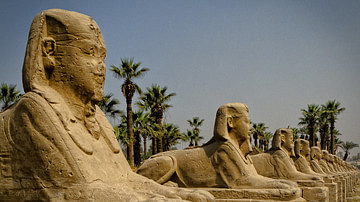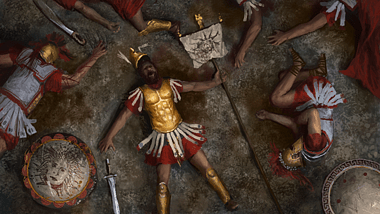
Pelopidas (c. 410 - 364 BCE) was a gifted Theban general and leader of the elite Sacred Band who, along with Epaminondas, is credited with helping Thebes rise to its greatest power. Defeating the mighty Spartans in several battles Pelopidas continued his military career with successful campaigns in Thessaly. He is the subject of one of Plutarch's Lives biographies.
Early Life & Career
Pelopidas was the son of Hippokles and born into an aristocratic Theban family. According to Plutarch he was generous with his money but lived austerely, he married and had children, and was a keen wrestler and hunter. We know that in his youth Pelopidas fought against Sparta during the siege of Mantinea in 386 BCE. According to Plutarch, he and Thebes' other great future general Epaminondas fought side by side, and the latter, although twice wounded, fought desperately to protect the even more badly wounded Pelopidas, saving his life. When Sparta took control of the Theban acropolis (Kadmeia) in 382 BCE, Pelopidas fled to Athens.
Pelopidas first came to prominence in his own right in 379 BCE, the year he was first made boeotarch, the highest position in the Theban government. It was a role he would take no fewer than 13 times. Pelopidas had famously led a group of Theban exiles and kicked out the Spartan garrison at Kadmeia in 379 BCE and the following year was credited with contributing to the establishment of democratic government at Thebes. The city now led the revived Boeotian League (aka Boeotian Confederacy) in readiness for further territorial expansion. It seemed that Thebes had found itself one of its greatest ever leaders. As Plutarch states,
From the moment when his countrymen first chose him as their commander, there was not a single year in which they did not elect him to office, either as captain of the Sacred Band or more often as Boeotarch, so that he remained continuously on active service until the time of his death. (Pelopidas, 82)
Pelopidas famously led the elite Sacred Band and defeated a Spartan army at Tegyra in Boeotia in 375 BCE in a quick-thinking and aggressive attack in the narrow pass. This was the first time that the Sacred Band had been used as a separate fighting unit. Founded by Gorgidas and consisting of 300 hoplite infantrymen linked in homoerotic pairs, the idea was that the soldiers would fight better if their lover were at their side. However, it was to be at the important Battle of Leuctra in 371 BCE, that Pelopidas established his reputation as a brilliant commander when, along with his fellow general Epaminondas, he inflicted a decisive defeat on Sparta.
Battle of Leuctra
At Leuctra Epaminondas took overall command of the army while Pelopidas once again commanded the Sacred Band, positioned on the Theban left wing. The strategies that Epaminondas employed in the battle were not entirely new, but in the past they had been used more out of necessity rather than planning, and no one had ever combined them to create such a winning formula. Epaminondas massively strengthened his left wing, he used cavalry in front of the hoplite lines, he decided to attack at an angle and employ an echelon formation, and he went for a direct frontal attack on the opposing commander's position (led by Pelopidas and the Sacred Band). These movements were, collectively, the most innovative and devastating pre-meditated military strategy ever seen in Greek warfare and Spartans had no answer.
The defeat of mighty Sparta shocked the Greek world, and the victory monument set up by the Thebans at the site is still visible today. Thebes went on to create a new Arcadian capital at Megalopolis and was now firmly established as the most powerful city-state in Greece, a position it consolidated with the two generals invading the Spartan territory of Laconia in 370 BCE, taking Messenia in 369 BCE, and generally dismantling any remaining ties in the Peloponnesian League.
Campaigns in Thessaly
In 369 BCE both Pelopidas and Epaminondas were charged with exceeding their authority and serving beyond their term of office as boeotarchs, however, both were acquitted. As Epaminondas campaigned in the south Pelopidas did so in Thessaly, to the north. He forged an alliance between Thebes and Thessaly and conquered Larissa from Alexander II of Macedon, in the process taking the future Macedonian king Philip as a hostage back to Thebes where he studied military tactics. Things did not go so well against the tyrant Alexander of Pherai in 368 BCE, and Pelopidas was himself taken prisoner. Only the arrival of Epaminondas and a Boeotian army secured his release in 367 BCE. In the same year, Pelopidas was sent on a mission to the Persian king Artaxerxes II to gain Thebes protection of its interests in Greece but its allies rejected the negotiated terms. The Persians did, though, promise to supply the Thebans with a fleet of 200 ships.
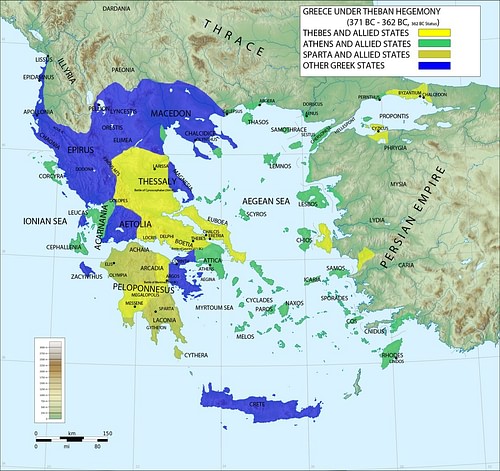
Back in Greece, Pelopidas got his revenge on Alexander in 364 BCE when he defeated him and his larger army at Kynoskephalai in Thessaly and thereby forced the Macedonians to join the Boeotian League. Unfortunately, Pelopidas did not enjoy the victory himself as he was killed in the battle when he rashly charged the enemy single-handedly. A statue was set up in his honour at the sacred site of Delphi. As Plutarch summarises,
It was no wonder that those of the Thebans who were present at Pelopidas' death should have been plunged into grief and called him their father, their savior and their teacher of all that was best and noblest. (Pelopidas, 101)
Shortly after Pelopidas' demise, in 362 BCE, Epaminondas fell too in the indecisive Battle of Mantinea against a Spartan and Athenian-led alliance. With the loss of their two great generals, Theban dominance began to wane, and Sparta and Athens would become the two major players in Greece once again.
